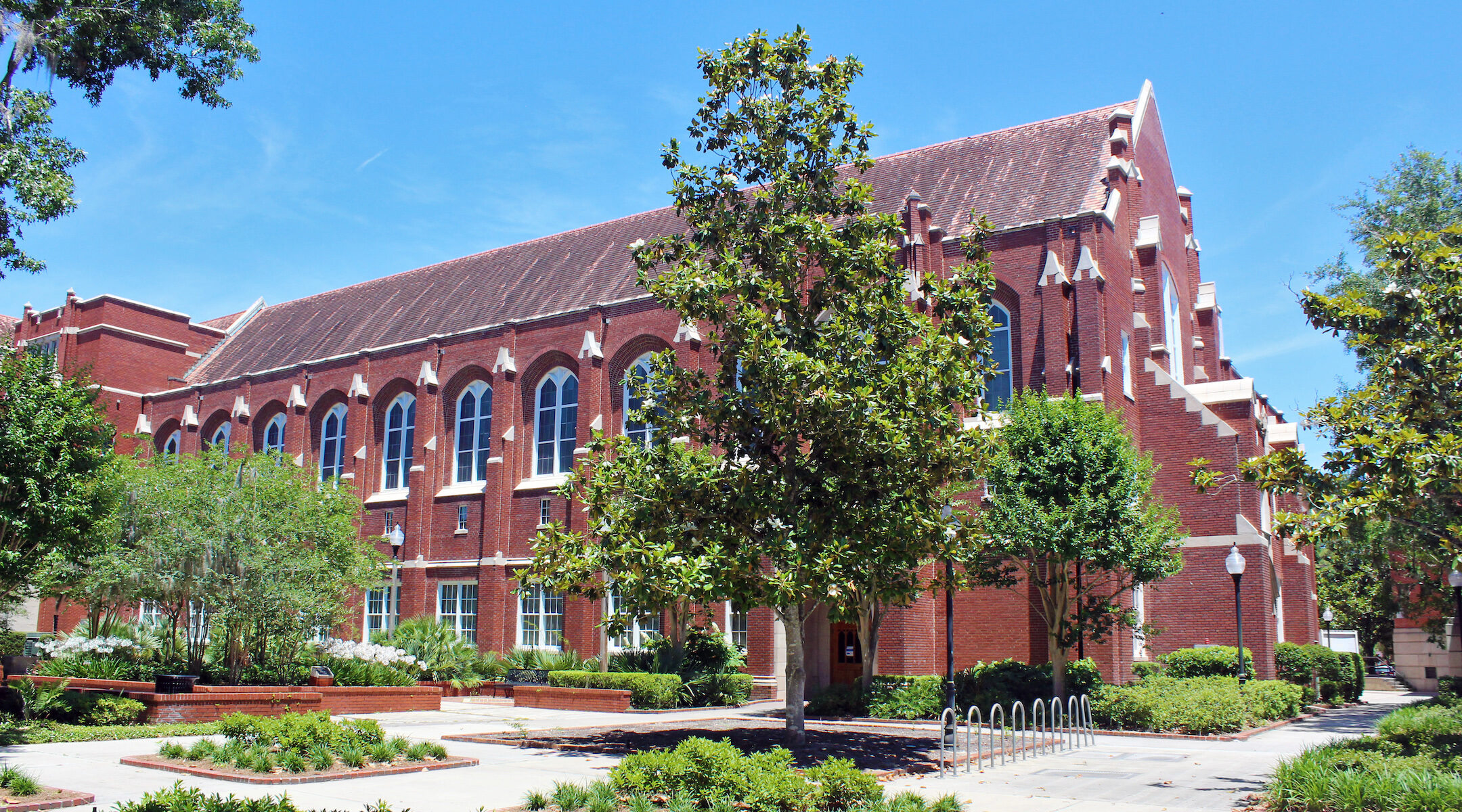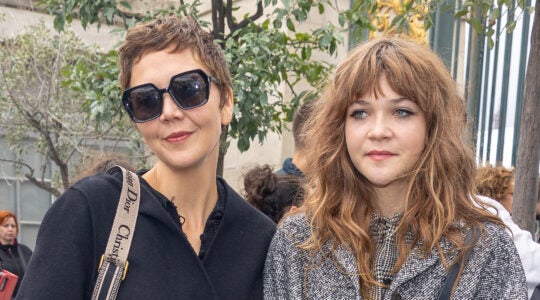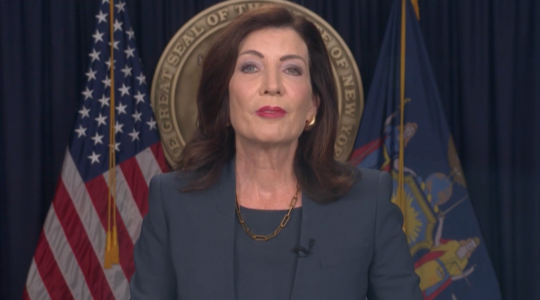(JTA) — The University of Florida has more Jewish students than any other public college in the United States — and last week, one of them reached out to a professor, fearing that it would no longer be possible to study Jewish topics there.
Citing a graphic that had been making the rounds on social media, the student asked if it was true that a new bill working its way through the state legislature would remove all “Jewish Studies courses, majors and minors” in the state. The graphic was shared by several people with large online followings, including comedian D.L. Hughley, who has more than 750,000 followers on Twitter.
“I love my major and I can’t imagine switching to anything else,” the student wrote, according to Norman Goda, director of the university’s Center for Jewish Studies.
Goda wasn’t able to console the student. Like other Jewish academics in Florida who spoke to the Jewish Telegraphic Agency, he doesn’t know whether H.B. 999 would affect Jewish studies on the state’s college campuses. Though the bill’s author — a Republican state representative — says that won’t be the case, the bill’s language is much less clear.
That’s because the bill’s current wording would forbid the state’s public higher education institutions from teaching or offering any major or minor based in “methodology associated with Critical Theory.” That prohibition, say academics and other critics of the bill, would make teaching courses in Jewish studies impossible — and would also outlaw many other fields in higher education.
Exactly what the bill means by “critical theory” is unclear. To academics, the term refers to a tool for analyzing society and culture, created in the 1930s by German Jewish academics, that encourages people to view the world through power structures, and to consider why they fall short. To political conservatives, it’s a relative of “critical race theory,” a watchword for those who want to inhibit classroom instruction about racism. An earlier version of H.B. 999 mentioned only critical race theory, not the umbrella theory.
“These people don’t know what they’re talking about,” said a Jewish faculty member at a Florida university, who requested anonymity due to fear of retaliation from the state government, regarding the lawmakers behind H.B. 999. “You’re putting people who don’t know what critical theory is, but have heard the words — and now you’re putting them in charge of universities.”
A university that completely purged such ideas from its classrooms, the anonymous faculty member said, “would be non-existent.”
The bill in question is the latest example of conservative-led state efforts to snuff out culture-war modes of thought like critical race theory and gender studies, often referred to euphemistically by lawmakers as “divisive concepts” in education. Such efforts have occasionally ensnared efforts to teach Jewish history and the Holocaust.
Attempts to legislate the classroom are particularly potent in Florida, where Republican governor Ron DeSantis, a likely presidential candidate, has frequently stated his desire to ban “woke” concepts from being taught in the state. (DeSantis has stated he will wait to see H.B. 999’s final form before he decides whether to sign it, but in a discussion with college administrators last week he continued to rail against what he called the “ideological agenda” of campus diversity, equity and inclusion programs.)
The state recently rejected the curriculum for a new Advanced Placement African-American Studies course in high schools, forcing the College Board to rework the class. Florida is also home to several active conservative “parents’ rights” groups that have lobbied to remove objectionable books and clubs from public schools.
While most legislation in this realm to date has targeted what’s taught in K-12 public schools, this bill and other efforts in Florida have gone a step further by seeking to regulate the world of state-funded higher education — creating what critics say are new and dangerous threats to academic freedom, with broad and vague wording that leaves efforts to research and teach a variety of disciplines in doubt.
“This bill would cripple the long-standing freedom universities have to design and teach a curriculum based on the development of academic disciplines,” Cary Nelson, an emeritus professor at the University of Illinois and past president of the American Association of University Professors ,who has taught multiple courses on Jewish issues, told JTA.
In a recent subcommittee hearing on the bill, Republican state Rep. Alex Andrade, who co-authored the legislation, said, “I believe that state universities should be focused on teaching students how to think, not what to think.” He said the bill’s banning of “radical” ideologies referred to “a system meant to direct and promote certain activism to achieve a specific viewpoint.”
Efforts to limit the material taught to children and college students are underway in several states. But Florida has an especially large population of Jewish students. The University of Florida stands atop Hillel International’s ranking of public colleges with the highest proportion of Jewish students, and the University of Central Florida has the third-largest. Florida State University, Florida International University, Florida Atlantic University and the University of South Florida also rank in the top 60.
H.B. 999 would affect education at those schools in other ways, too. The bill, which recently advanced to committee, would overhaul the state’s post-tenure review process, so that instead of checking on a faculty member’s research productivity every five years, as is currently the case in the state, tenured professors could face reviews “at any time for cause” including “violation of any applicable law or rule.”
The result, one academic in the state said, would be “open season on faculty,” who could be out of a job if their university’s board — which, in public schools, is beholden to the governor — disagrees with their syllabus.
Andrade rejected the idea that H.B. 999 would undercut Jewish studies in Florida.
“Outsiders are wrong. Ethnic studies are not affected by the bill either by the bill’s intent or the bill’s language,” Andrade wrote in an email to JTA, accusing the bill’s critics of “lying and claiming that Florida’s leaders have tried to ban teaching black history in schools.”
The state’s only Jewish Republican legislator, state Rep. Randy Fine, did not return a JTA request for comment on whether he supports the bill. Fine has promoted similar culture-war legislation in the past, including a bill he co-authored in February that would prohibit all K-12 schools in the state from referring to either students or employees by pronouns that do not correspond to the sex they were assigned at birth.
With a Republican-dominated House and Senate, some form of H.B. 999 seems likely to reach DeSantis’ desk. (A parallel bill in the state Senate does not contain wording on critical theory.) But there is strong opposition from the academic community. Groups including the American Historical Association, the American Association of University Professors and Florida’s statewide faculty union have harshly condemned the bill and urged lawmakers to oppose it.
The American Historical Association’s statement on the bill this month calls it a “blatant and frontal attack on principles of academic freedom and shared governance central to higher education in the United States.” More than 70 academic, historical and activist organizations co-signed the statement.
The executive committee of the Association for Jewish Studies signed a different statement authored by the American Council of Learned Societies, decrying the bill as an “effort to undermine academic freedom in Florida.”
“If it passes, it ends academic freedom in the state’s public colleges and universities, with dire consequences for their teaching, research, and financial well-being,” the statement said of the bill. “Academic freedom means freedom of thought, not the state-mandated production of histories edited to suit one party’s agenda in the current culture wars.”
Asked for comment on the bill, Warren Hoffman, the executive director of the Association for Jewish Studies, pointed to the statement.
Rachel Harris, director and endowed chair at Florida Atlantic University’s Jewish Studies program, is in her first semester at the university, having just arrived from the University of Illinois. “I’m now wondering if that was a terrible mistake,” she joked. (Harris is spending this term in Israel, researching on a Fulbright fellowship.)
Still, Harris said she was “confident” that legislators would “continue to support educational commitments in the state,” noting that Florida has a Holocaust education mandate for K-12 public schools. Her Boca Raton university is currently building an expanded center for Jewish and Holocaust studies, funded by private donors. H.B. 999 in its current form would prohibit universities from teaching critical theory concepts even when such programs are privately funded.
Despite what he described as a few students at the Jewish Studies center who are concerned about the new bill, Goda said he did not think the legislation would change the experience of Jewish students on his campus.
“Jewish kids these days are really choosing universities based on whether or not Jewish kids feel comfortable there,” he said. “And I would argue that [the University of Florida] is a very welcoming campus for Jewish kids overall. There are strong Jewish institutions associated with the campus.”
Instead, he feels the bill’s real effects would be felt in the state’s ability to recruit faculty and staff while its legislators jeopardize academic freedom, tenure and other lodestars of the humanities. He said, “The real question to me is how and in what way it’s going to be enforced.”
JTA has documented Jewish history in real-time for over a century. Keep our journalism strong by joining us in supporting independent, award-winning reporting.






